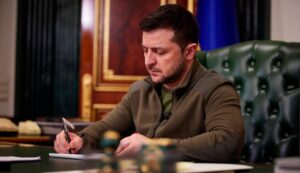
Polish President Karol Nawrocki has signed a law on “aid to Ukrainian citizens” aimed at regulating the future status of Ukrainians living in Poland, his office said.
According to the head of the president’s office, Zbigniew Bogucki, this law is the “last” in the framework of special assistance to Ukrainians. It extends the legal stay of Ukrainian citizens who have fled the war until March 4, 2026, and links the right to receive social assistance to criteria such as employment or children’s education in Polish schools.
“The decisions laid down in this law effectively put an end to tourism from Ukraine at the expense of Polish taxpayers,” Bogucki said at a press conference. He stressed that with the adoption of the law, Poland intends to “move to normal conditions” by applying the same rules to Ukrainian citizens as to other foreigners residing in the republic.
The main provisions of the law
• Extension of the period of legal stay in Poland under temporary protection status until March 4, 2026.
• Restriction of access to benefits: payments will depend on the availability of work or education for children. Exceptions are provided for parents of children with disabilities.
• Strengthening control over the use of the “special assistance” mechanism and clarifying the legal status of Ukrainians in Poland.
• The desire to reform the assistance system so that it eventually approaches a standard migration system.
Lawmakers in the president’s office say that further continuation of this scheme is impossible, and now Ukraine and Poland must move towards more sustainable regulation of the stay, employment, and integration of Ukrainians.
According to media reports, there are at least 1.5 million Ukrainian citizens in Poland in 2025.
Source: http://relocation.com.ua/polish-president-signs-law-extending-aid-to-ukrainians-until-march-4-2026/

Ukrainian President Volodymyr Zelensky has signed a law recognizing Ukrainian citizens who were forcibly resettled from the territory of the Polish People’s Republic in 1944-1951 as deportees. The relevant law card No. 4540-IX with the signature of the President of Ukraine has been published on the website of the Verkhovna Rada.
Ukrainian Foreign Minister Andriy Sibiga noted that this law restores historical justice regarding this “horrible crime.”
“President of Ukraine Volodymyr Zelenskyy has just signed an important law restoring the memory of Ukrainians forcibly deported from Poland in 1944-1951. This is a correct and dignified step that restores historical justice regarding this horrific crime. I thank the president for supporting this decision, as well as the members of parliament who developed and implemented it,” he wrote on his Facebook page.
The minister noted that “many witnesses of those tragic events have already passed away,” but in order to protect the rights of “those who still live with us and their descendants,” Ukraine guarantees the provision of assistance as provided by law.

Head of business security practice at Juscutum law firm Oleksandr Horobets supported the adopted amendments to the CPC regarding NABU and SAP.
“Instead of political manipulation – legal clarity. Bill No. 12414 for the first time clearly establishes the boundaries of authority and raises the standards of human rights protection,” he said in a comment transmitted to the Interfax-Ukraine news agency on Wednesday.
In his opinion, in the framework of expanding the powers of the Prosecutor General, the law returns the situation to the legal field, because the expansion of the competence of the SAP from January 1, 2024, according to the law №3509-IX, contradicted the norm of the Constitution that the powers of the Prosecutor General can not be transferred to another prosecutor.
“A significant achievement of the draft law is the elimination of the destructive practice of conducting searches without court orders. The draft clearly limits this right exclusively to cases where there is an urgent need to save a person’s life, health, sexual freedom, safety or to preserve evidence of these crimes. This approach is worthy of the highest praise, because it is a direct step towards strengthening the guarantees of protection of the rights and freedoms of Ukrainian citizens from unjustified interference in private life”, – the head of Juscutum’s business security practice is of the opposite opinion to the UBA.
He added that the adopted law also provides a number of additional guarantees for the participants of the proceedings, in particular, the request to extend the pre-trial investigation up to 12 months must now be coordinated personally by the Prosecutor General, and his deputies will not have such a right.
Horobets believes that the adopted law leaves a wide range of legal opportunities for this NABU to work in a civilized and productive manner, and reminds that the expansion of powers of the SAP occurred only from January 1, 2024, and before that this body also worked effectively.
The lawyer also noted that the changes made concern all law enforcement agencies and structures, not only anti-corruption, so we should not talk about selective intervention.
“Bill No. 12414 is not a threat, but an important step towards a more efficient, constitutional and human rights-based justice system in Ukraine. It is designed to eliminate imbalances, strengthen guarantees of citizens’ rights and make the work of law enforcement agencies more transparent and responsible,” summarized the head of Juscutum’s business security practice.

On Wednesday, President of Ukraine Volodymyr Zelenskyy signed a law on taxation of remuneration for gig contracts of Diia.City residents (draft law No. 9319) with an amendment to bring new tax rules (draft law No. 11416d) into force for individual entrepreneurs and legal entities on a single tax from January 1, 2025, said Danylo Hetmantsev, chairman of the parliamentary committee on taxation and customs policy.
“Draft Law 9319 has been signed. The increase for individual entrepreneurs comes into force on January 1. Everything is as promised,” he wrote in his telegram channel.
His deputy Yaroslav Zheleznyak noted that the law had been awaiting the president’s signature for 17 days.
As reported, on November 28, the President of Ukraine signed Law 4015-IX (Bill No. 11416-d) on amendments to the Tax Code regarding the peculiarities of taxation during martial law. The document envisages an increase in the military tax from 1.5% to 5% starting from October 1 this year, a 50% increase in the bank profit tax in 2024, and an increase in a number of other taxes and fees.

The Committee on Legal Policy recommends that the Verkhovna Rada adopt the draft law (No. 9235) on certain issues of disclosure of banking secrecy and measures to establish custody of the property of a missing person, the press service of the Ukrainian parliament’s apparatus reports.
The draft law proposes to amend the Civil Code and the laws “On Notaries”, “On Banks and Banking” and “On the Legal Status of Persons Missing in Special Circumstances”.
The draft law, in particular, defines the procedure for notaries to establish guardianship over the property of an individual who has been declared missing or a person who has gone missing under special circumstances. The draft law expands the list of persons to whom banks may disclose information constituting bank secrecy. In particular, it provides for its disclosure at the request of notaries to perform a notarial act to take measures to establish guardianship over the property of an individual who has been declared missing or a person who has gone missing under special circumstances.
The adoption of the draft law will allow family members of an individual who has been declared missing or missing under special circumstances to receive a notarized certificate of guardianship over the property of such persons. The law will also ensure the protection of the rights and interests of Ukraine in foreign jurisdictions in cases related to compensation for damage caused as a result of an international armed conflict in the country.
On May 23, the Verkhovna Rada adopted in the first reading a draft law amending certain laws on certain issues of disclosure of banking secrecy.